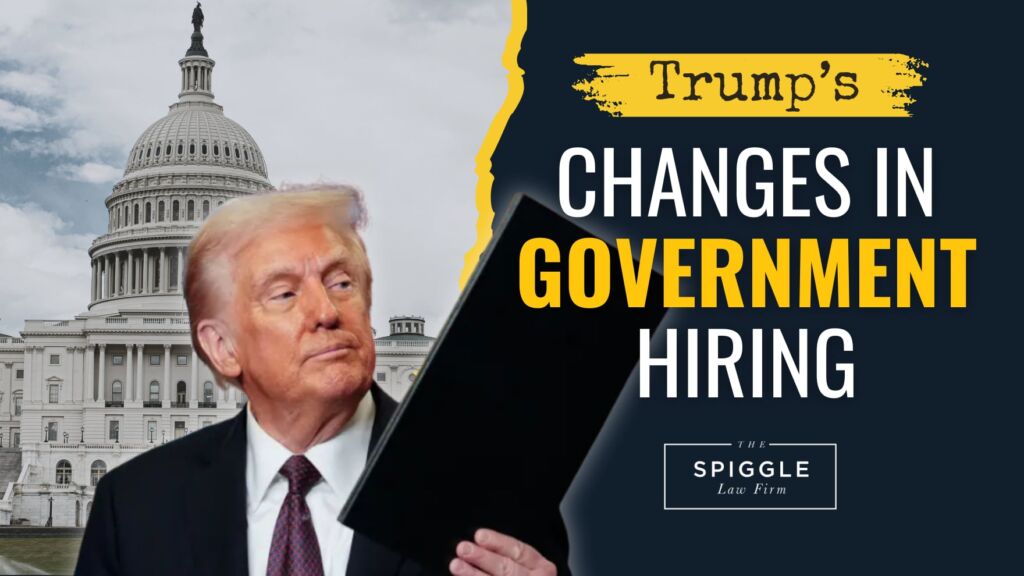The federal hiring process is undergoing a significant shift under a new executive order signed by President Trump during his latest term. Titled “Reforming the Federal Hiring Process and Restoring Merit to Government Service,” this order restructures how federal agencies recruit, evaluate, and hire employees.
While the administration argues that the order will make hiring faster, more transparent, and merit-based, critics worry it could disrupt career pathways for certain workers—particularly those who have benefited from diversity initiatives, equity programs, or traditional hiring practices.
At The Spiggle Law Firm, we advocate for federal employees and job seekers, ensuring they understand their rights and protections in a rapidly changing employment landscape. Here’s what the new hiring changes mean for those currently seeking federal jobs or already working in government.
Key Changes in the Federal Hiring Process
The executive order seeks to prioritize technical skills and hiring efficiency while eliminating diversity programs and alternative hiring pathways. Below are the major changes, along with how they could affect workers.
Merit-Based Hiring: A Shift in Evaluation Criteria
- Federal hiring will now center on technical qualifications rather than traditional resume-based credentials.
Potential Impact:- This could benefit job seekers who excel in practical skills but lack formal credentials.
- However, workers who relied on alternative hiring programs, such as diversity initiatives or veteran-preference pathways, may find fewer opportunities.
Removal of Certain Hiring Preferences
- Hiring decisions will no longer consider race, sex, or equity-based initiatives.
- Potential Impact:
- This could streamline the process for some applicants, but others may lose opportunities previously available through affirmative action or specialized hiring tracks.
- Workers from underrepresented groups who have historically faced barriers to federal employment may face increased competition.
New Technical Assessments for Job Candidates
- The Chance to Compete Act of 2024 expands the use of skills-based assessments instead of relying on degrees or resumes.
- Potential Impact:
- Applicants with strong technical skills but limited formal education could benefit.
- However, those who have spent years building careers in government under traditional hiring models may struggle to adapt to new testing requirements.
Faster Hiring Timelines
- The federal government aims to reduce hiring timelines to under 80 days.
- Potential Impact:
- Applicants may receive quicker hiring decisions.
- However, faster timelines could mean less thorough vetting, potentially leading to uncertainty about hiring fairness.
Transparency in the Hiring Process
- Agencies will be required to provide regular updates on application status.
- Potential Impact:
- Job seekers will have more clarity about where they stand in the hiring process.
- However, if the hiring criteria are not clearly outlined, some candidates may struggle to understand why they were not selected.
Increased Use of Technology in Hiring
- Federal agencies will expand the use of AI and digital platforms for hiring decisions.
- Potential Impact:
- While technology could streamline recruitment, it also raises concerns about algorithmic bias and whether AI-driven hiring will fairly evaluate all candidates.
Concerns for Current and Prospective Federal Employees
To ensure compliance with these reforms, federal agency leadership will play a greater role in overseeing hiring practices.
The Office of Personnel Management (OPM) will:
While some job seekers may welcome the shift toward a skills-first hiring model, others may face new hurdles in the federal job market. Here are some of the biggest concerns for workers:
🔹 Elimination of Diversity Hiring Programs – The removal of equity-based hiring initiatives could reduce job opportunities for marginalized groups, making it harder to enter federal service.
🔹 Less Emphasis on Traditional Experience – While practical skills will be prioritized, experienced workers who have built careers under the old system may face challenges adapting.
🔹 Increased Reliance on Testing – If technical assessments become the primary hiring tool, workers with strong resumes but weaker test performance could be disadvantaged.
🔹 Job Security Risks – Employees already in government roles may be affected by shifting expectations, potential restructuring, or increased competition for promotions.
🔹 Legal Questions – The changes must still comply with Title VII of the Civil Rights Act of 1964, which protects workers from discrimination based on race, gender, and other protected categories.
What Can Federal Employees and Job Seekers Do?
If you are currently applying for a federal job or working in government, here’s how to prepare for these changes:
✔️ Strengthen Your Technical Skills – Since hiring will emphasize skills over degrees, consider professional development, certifications, and hands-on training.
✔️ Stay Informed About Hiring Policies – Federal hiring practices vary by agency, so monitor updates from the Office of Personnel Management (OPM).
✔️ Advocate for Your Rights – If you experience discrimination or unfair hiring practices, consult with a federal employment attorney.
✔️ Be Proactive in Career Planning – With new hiring rules, understanding your options early can help you make informed career decisions.
Stay Informed & Protect Your Federal Career
At The Spiggle Law Firm, we specialize in federal employment law, ensuring workers understand their rights and protections during policy changes. If you are experiencing hiring discrimination, workplace retaliation, or career uncertainty, we are here to help.
📩 Need legal guidance? Contact The Spiggle Law Firm today for a consultation.
👉 https://spigglelaw.com/government/
📺 Watch Our Full Video Breakdown:





